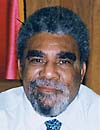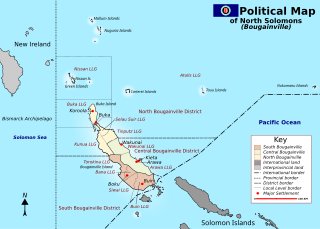
Papua New Guinea, officially the Independent State of Papua New Guinea, is a country in Oceania that comprises the eastern half of the island of New Guinea and its offshore islands in Melanesia. Its capital, located along its southeastern coast, is Port Moresby. Although government estimates have placed the country's population at 9.4 million, a report conducted in December 2022 suggests the true population is close to 17 million. The country is the world's third largest island country, with an area of 462,840 km2 (178,700 sq mi).

The Papua New Guinea Defence Force (PNGDF) is the military organisation responsible for the defence of Papua New Guinea. It originated from the Australian Army land forces of the territory of Papua New Guinea before independence, coming into being in January 1973 and having its antecedents in the Pacific Islands Regiment. The PNGDF is a small force, numbering around 2,500 personnel, and consists of a Land Element, an Air Element and a Maritime Element. It is a joint force tasked with defending Papua New Guinea and its territories against external attack, as well as having secondary functions including national-building and internal security tasks.

The economy of Papua New Guinea (PNG) is largely underdeveloped with the vast majority of the population living below the poverty line. However, according to the Asian Development Bank its GDP is expected to grow 3.4% in 2022 and 4.6% in 2023. It is dominated by the agricultural, forestry, and fishing sector and the minerals and energy extraction sector. The agricultural, forestry, and fishing sector accounts for most of the labour force of PNG while the minerals and energy extraction sector, including gold, copper, oil and natural gas is responsible for most of the export earnings.

Port Moresby, also referred to as Pom City or simply Moresby, is the capital and largest city of Papua New Guinea. It is one of the largest cities in the southwestern Pacific outside of Australia and New Zealand. It is located on the shores of the Gulf of Papua, on the south-western coast of the Papuan Peninsula of the island of New Guinea. The city emerged as a trade centre in the second half of the 19th century. During World War II, it was a prime objective for conquest by the Imperial Japanese forces during 1942–43 as a staging point and air base to cut off Australia from Southeast Asia and the Americas.

Bougainville, officially the Autonomous Region of Bougainville, is an autonomous region in Papua New Guinea. The largest island is Bougainville Island, while the region also includes Buka Island and a number of outlying islands and atolls. The interim capital is Buka, although this is considered temporary, with the capital likely to move. One potential location is Arawa, the previous capital.

The Right Honourable Sir Mekere Morauta was a Papua New Guinean politician and economist who served as the 7th Prime Minister of Papua New Guinea from 1999 to 2002. Inheriting a depressed economy and a fractious legislature, he embarked on fundamental reforms of the country's economy and political system.
Religion in Papua New Guinea is predominantly Christian, with traditional animism and ancestor worship often occurring less openly as another layer underneath or more openly side by side Christianity. The courts, government, and general society uphold a constitutional right to freedom of speech, thought, and belief. There is no state religion, although the government openly partners with several Christian groups to provide services, and churches participate in local government bodies.

The Melanesian Spearhead Group (MSG) is an intergovernmental organization, composed of the four Melanesian states of Fiji, Papua New Guinea, Solomon Islands and Vanuatu, and the Kanak and Socialist National Liberation Front of New Caledonia. In June 2015, Indonesia was recognized as an associate member.

The Territory of Papua and New Guinea, officially the Administrative Union of the Territory of Papua and the Territory of New Guinea, was established by an administrative union between the Australian-administered territories of Papua and New Guinea in 1949. In December 1971, the name of the Territory changed to "Papua New Guinea" and in 1975 it became the Independent State of Papua New Guinea.

Sir Michael Thomas Somare was a Papua New Guinean politician. Widely called the "father of the nation", he was the first Prime Minister after independence. At the time of his death, Somare was also the longest-serving prime minister, having been in office for 17 years over three separate terms: from 1975 to 1980; from 1982 to 1985; and from 2002 to 2011. His political career spanned from 1968 until his retirement in 2017. Besides serving as PM, he was minister of foreign affairs, leader of the opposition and governor of East Sepik Province.

The monarchy of Papua New Guinea is a system of government in which a hereditary monarch is the sovereign and head of state of Papua New Guinea. The current monarch and head of state, since 8 September 2022, is King Charles III. Although the person of the sovereign is equally shared with 14 other independent countries within the Commonwealth of Nations, each country's monarchy is separate and legally distinct. As a result, the current monarch is officially titled the King of Papua New Guinea and, in this capacity, he and other members of the Royal Family undertake public and private functions domestically and abroad as representatives of the Papua New Guinean state. However, the King is the only member of the Royal Family with any constitutional role. The monarch lives predominantly in the United Kingdom and, while several powers are the sovereign's alone, most of the royal governmental and ceremonial duties in Papua New Guinea are carried out by the monarch's representative, the governor-general.

The Royal Papua New Guinea Constabulary (RPNGC) is a national police force with jurisdiction throughout all of Papua New Guinea.

Coffee production in Papua New Guinea is the country's second largest agricultural export, after oil palm, and employs approximately 2.5 million people. It accounts for approximately 1% of world production, according to the United Nations Conference on Trade and Development (UNCTAD).

Deforestation in Papua New Guinea has been extensive and in recent decades from 2001 to 2020, Papua New Guinea lost 1.57Mha of tree cover, equivalent to a 3.7% decrease in tree cover since 2000, and 1.15Gt of CO₂e emissions.

Corruption is rife in Papua New Guinea (PNG). According to The Economist, "PNG's governments are notorious for corruption, and ever run the risk of turning the state into a fully-fledged kleptocracy".
Investigation Task Force Sweep was established in Papua New Guinea (PNG) on 12 August 2011, following a resolution by the National Executive Council (NEC). The initiative was spearheaded by Prime Minister Peter O'Neill as part of his well-publicised anti-corruption drive.

The Development Policy Centre (Devpol) is an aid and development policy think tank based at the Crawford School of Public Policy in the College of Asia and the Pacific at the Australian National University. Devpol undertakes independent research and promotes practical initiatives to improve the effectiveness of Australian aid, to support the development of Papua New Guinea and the Pacific Islands region, and to contribute to better global development policy.

The Bougainville conflict, also known as the Bougainville Civil War, was a multi-layered armed conflict fought from 1988 to 1998 in the North Solomons Province of Papua New Guinea (PNG) between PNG and the secessionist forces of the Bougainville Revolutionary Army (BRA), and between the BRA and other armed groups on Bougainville. The conflict was described by Bougainvillean President John Momis as the largest conflict in Oceania since the end of World War II in 1945, with an estimated 15,000–20,000 Bougainvilleans dead, although lower estimates place the toll at around 1,000–2,000.
Meri Toksave is a youth-led, non-profit, non-governmental organisation that designs and delivers programmes and partnerships for the promotion and protection of human rights, the empowerment of women and girls, the advancement of gender equality, and the prevention and elimination of domestic, sexual and gender-based violence in Papua New Guinea.

The Papua and New Guinea Development Bank commenced operations on 6 July 1967 from an office in Port Moresby. The Bank played a significant role in the economic development of the country immediately prior to and after it achieved independence on 16 September 1975.